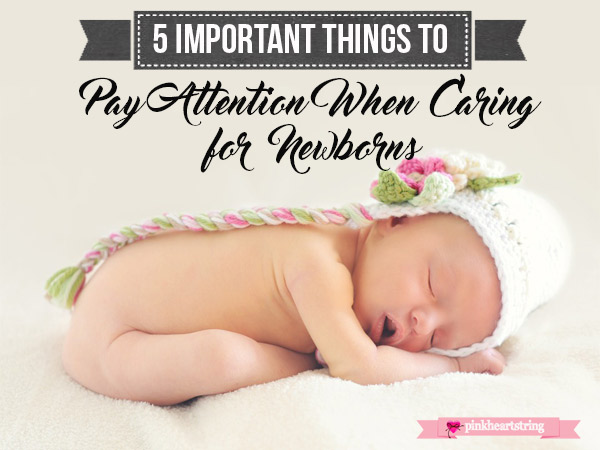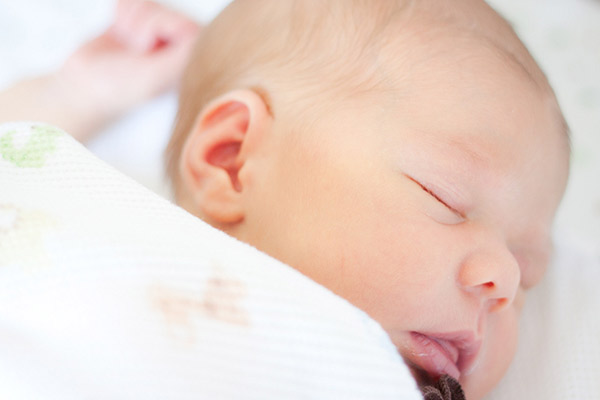Today, we have a guest post from Emma of ShrewdMommy. She will give us tips on how to take care of newborn babies.

Meeting your newborn baby after birth may be the most incredible moment for all parents. But since then, you have to face a new challenge: taking care of your newborn. It is undeniably a difficult job, especially for first-time parents. However, there are some things you need to keep in mind, which alleviate your work taking care of an infant.
Feeding
Feeding newborn babies seems to be the top concern for parents since it is the first decision you make to your baby, and it plays a central role in the growth of your kid. Breastfeeding or bottle feeding is are a tough question for many parents.
It is medically proven that breastfeeding is the most beneficial to your newborns since breast milk provides almost important nutrients like protein, lactose, and fat for your kids. Especially, the nutrients in breast milk could be digested easily, which is perfectly beneficial to child’s digestion system.
Also, antibiotics in breast milk could do a great job protecting your kids from many infectious illnesses such as respiratory infection or diarrhea. For mom, breastfeeding helps you to get in shape more quickly.
Another form of baby feeding is bottle feeding or formula feeding. For some reason, if breastfeeding is not preferable or possible; formula feeding may be a good alternative.

Because commercially prepared formulas imitate breast milk, they may provide your kids necessary nutrients. However, nutrients in commercial formulas take more time to be digested, so newborns with formula feeding need fewer feedings than those who breastfeed.
Bear in mind; you have to use feeding bottles and associated equipment sterilized to kill bacteria that are harmful to your angle. Some may boil the feeding bottles and equipment in warm water, but for the best result, buying a good bottle sterilizer is highly recommended.
Sleeping
As the infant sleep patterns are unpredictable, parents usually have to stay on a tiring schedule. Your baby might sleep a lot during the day while becoming a night owl, and you have to get up a couple of time during the night to feed him or change a diaper.
In fact, newborns sleep a lot, up to 16 to 17 hours per day. When they get to 6 to 8 weeks of age, the babies start to sleep less during the day but more at night, and at 6 to 8 months, the sleep time of babies fall to8 to 12 hours per day. Hence, if you understand sleep pattern of your baby, you absolutely may get him into good sleep habit.

Diapering
It may come to your surprise to know that babies need diaper changes a lot. Some baby may use up to 10 or more diaper per day. Diaper change is normally challenging to first-time parents, but some practice may get you skillful.
There are 2 popular types of diaper: disposable diapers and cloth diaper. Disposable has become increasingly popular thanks to the convenience and ease of use. By contrast, cloth diapers require washing after a diaper change, but it is a budget-friendly option since cloth diapers are much cheaper and can be reused.
If you use a disposable diaper, you have to make sure your babies comfortable in the diaper. If you come across some rash around baby’s leg and waist, change the brand of the diaper. Perhaps the diaper of the brand contains a substance that your babies are sensitive to.
For cloth diapers wash them right after diaper change to prevent the growth of bacteria and keep them separately from another laundry. You should choose a laundry detergent suitable for cloth diapers.
Also, remember to wash your hands before and after diaper change to prevent the spread of germ.
Bathing
Many people get scared of giving a baby bath at first since it is quite difficult to handle a slippery baby. You may ask your partner for help. A person holds the newborns while the other is giving a bath.
For infants of 3 to 8 weeks of age, you just need to give a sponge bath. Then, you may start to bath your baby 3 times per week after the umbilical cord falls off. Bathing could do a great job calming down crying or fussy babies.
Keep in mind that you have to use lukewarm water for a baby bath (too cold or too hot water is not good for newborns). Also, consult your pediatrician for recommended brands of baby oil, cream, shampoo, and soap.

Bonding
Bonding is of great importance for the growth of newborns. It helps to make your babies feel safe and loved. Mothers are encouraged to breastfeed your newborn right after birth to bond with him.
You should respond to your baby when he is crying, talk to him while you are changing a diaper, feeding or bathing him and cuddle him. Also, you can sing to him or give your infants skin to skin contact or massage. These could help your baby feel your love and attention and build trust.
Conclusion
It is never easy to handle a newborn, but you totally can manage it day by day. Try to get yourself prepared during pregnancy and don’t hesitate to ask for help from your partner and consult a pediatrician.
Author bio:
Emma is the founder of ShrewdMommy, where she and associates blog about pregnancy advice, parenting insights, tips for mommy. Those experiences will somehow help you in your search for questions about pregnancy and baby tips. You can find her on Twitter and Facebook!
Emma has such great list. Often, we tend to forget about the last entry – bonding. I agree on the importance of bonding. It will lead the way to a more beautiful parent-child relationship. Plus, the baby would grow uo confident of his parent's love and affection.